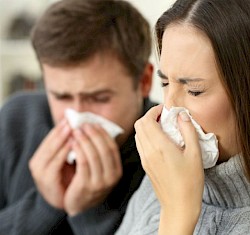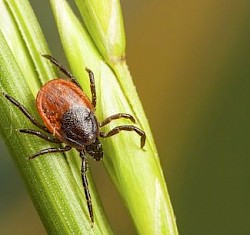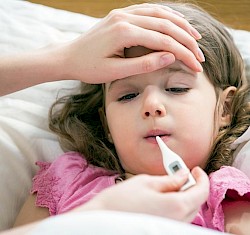
Did you know that your “chest cold” could actually be something a little more serious? Acute bronchitis, to be precise. Bronchitis often starts off as a simple common cold, but if the cold goes untreated it can worsen into this lower respiratory infection. Bronchitis is more common in fall and winter than in other seasons. The symptoms of bronchitis are similar to those of the common cold, but ...
Posted on Monday, November 25, 2019 8:00 am. READ MORE

Did you know that your “chest cold” could actually be something a little more serious? Acute bronchitis, to be precise. Bronchitis often starts off as a simple common cold, but if the cold goes untreated it can worsen into this lower respiratory infection. Bronchitis is more common in fall and winter than in other seasons. The symptoms of bronchitis are similar to those of the common cold, but ...
Posted on Monday, November 11, 2019 8:00 am. READ MORE

So, what exactly is the difference between the stomach virus, or viral gastroenteritis, and food poisoning? Well, not much. The symptoms are all quite similar, and the viruses associated with the stomach virus are ones linked to food poisoning. While it is often referred to as “stomach flu,” viral gastroenteritis isn’t related to the flu at all. Gastroenteritis is often caused by rotavirus or n...
Posted on Monday, September 23, 2019 8:00 am. READ MORE

Infectious mononucleosis, or simply “mono,” is a disease most commonly associated with teenagers and young adults. This is due to the stigma of mono being the “kissing disease.” It’s called this because it is transmitted through infected people’s saliva, so it is possible to contract it through kissing. Despite its nickname, though, it is far more common for people to get mono through sharing d...
Posted on Monday, September 16, 2019 8:21 am. READ MORE

While outdoor activities are fun, it's important to keep in mind there are various types of disease-carrying insects out just waiting for something (or someone) to pass by them to latch onto. One of these insects is, of course, the tick. Not every tick causes the same type of rash, as not all of them carry the same diseases. Here are the different types of rashes that can be caused by tick bite...
Posted on Monday, August 19, 2019 8:00 am. READ MORE

The front of your skull is composed of a series of hollow connecting areas that make up your sinuses. Just about the whole upper portion of your face has some sort of sinus cavity behind it. There are a pair in your forehead, a pair in your cheeks, and several along your nose between your eyes. No matter their location, they all branch off to join your nasal passages. The system is delicate and...
Posted on Monday, March 11, 2019 8:00 am. READ MORE

One of the most underappreciated functions of the body is mucus production. Yes, it’s pretty nasty, but mucus helps keep your sensitive nasal cavities flushed out of foreign— and possibly harmful— materials. It also keeps your nose from drying out while you’re breathing which saves you from some aches and pains.
Mucus is mostly composed of water, but it contains helpful things like proteins a...
Posted on Monday, March 4, 2019 8:00 am. READ MORE

Sinusitis is an infection that is a little hard to pin down as it has symptoms that are similar to other illnesses. As you may have gathered from its name, sinusitis is an infection in the sinuses. Irritation in the sinuses can cause them to become inflamed, which can lead to infection. This infection causes increased mucus production in the sinuses, but the swelling in these cavities prevents ...
Posted on Monday, February 11, 2019 8:00 am. READ MORE

Watch out for measles!
Cases of measles are popping up all across the country. So far, 10 states have reported cases of measles— including Texas. These outbreaks are getting closer and closer to home, so you may want to take some precautions to keep you and your family safe.
Measles is a highly contagious virus that can spread through the air via an infected person’s cough or sneeze. According to the CDC, measles is...
Posted on Wednesday, February 6, 2019 12:09 pm. READ MORE

Is your child feeling sick? Well, don’t call the school office just yet! Normal body temperature is 98.6 °F, but everyone’s body temperature (adults and children) fluctuates throughout the day depending on age, activity level, and many other factors. The magic number for fever in everyone though, no matter the age, is 100.4 °F.
It’s important to know that fever itself isn’t an illness but a sy...
Posted on Monday, January 21, 2019 8:15 am. READ MORE
Return to Top









